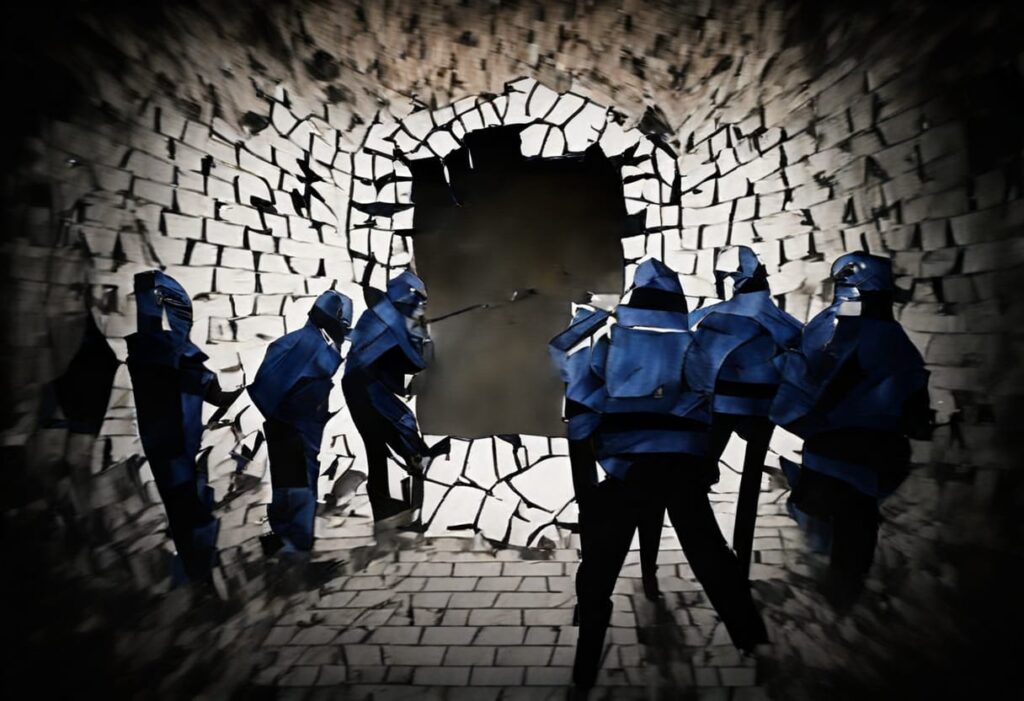
Great times of change are upon all of Western Civilisation.
Our entire world order has, until now, been based around a post-World War II ideology that was devised by globalist overlords in London, New York and Moscow, and smashed into the heads of the Boomers through television and movies. This ideology came with a complete set of moral values: liberalism, tolerance, diversity, materialism, egocentricism. The order of the Western World is based on this ideology. It’s so deeply ingrained that no movements seem to be able to form outside of it.
The suffocating nature of this ubiquitous ideology is causing great pain to young people, especially the Zoomers and younger Millennials. For them, it feels like the Boomers are exerting an economic stranglehold of such intensity that young people can never get ahead. The house price to wage ratio is four times as high today as it was 30 years ago. Young people watch most of their wages disappear in rents and mortgages, instead of building their own wealth. Creating a family is a forgotten dream for most.
All of this miserable arrangement will change when the Boomers are gone. When this happy day comes, a new way of thinking will prevail in the West. This new way might be better or it might be worse, or a blend of both at the same time, but what is clear is that a new way of thinking will prevail.
The oldest Boomers were born in 1945. That means the oldest of them are now around 80, very close to the natural life expectancy. So Boomers are starting to die off in large numbers. The deathgrip they have had over Western politics is weakening and will continue to weaken. 20 years from now, most Boomers will be dead, and the remainder will be too decrepit to defend that grip on political power. A movement of younger people will then sweep them away. This can be predicted with the confidence that an Anzac in June can predict the return of the Spring in a few months.
When the Boomers are gone, that entire world order based around them will also be gone. And a vacuum will arise.

The prediction of this author is that the post-Boomer ages will be a tough time for most of the world. America will be 50% white once the Boomers are gone. Europe will be whiter but their minorities are even more aggressive and difficult to integrate. China, Japan and Korea are facing fertility rates of less than one child per woman, and China is also facing severe environmental degradation. All of these places will likely have to deal with extreme civil unrest over the coming half a century.
The Anzac Empire, by contrast, will announce itself on the world stage at this time. After we federalise and our population hits 60 million – which ought to happen in 40 years or so – we will be in a position similar to that of America in 1890. We will be in position to take a leading role in the direction of the world.
This will coincide with mass immigration from America and Europe to the Anzac Empire. America and Europe, for all of their troubles, still have enormous numbers of high-value individuals. As the political systems of the Northern Hemisphere collapse, many of those high-value individuals will look for refuge elsewhere. If the Anzac Empire is clever, we will adopt an immigration policy that allows us to maximise the potential benefit of industrious and intelligent people fleeing the Atlantic region of the West, to both us and them.
Currently, the Boomers, having been brainwashed into multicultural equalitarianism, prevent such an intelligent immigration policy.
It’s illuminating to think of Boomers as a dam, holding back the flood of young Anzacs that will wash away the false order of the Boomer Truth Regime. That dam is now cracking. With every Boomer funeral the cracks widen another fraction of a millimetre. When several million of them are gone, that dam will burst, and the old way of doing things will be destroyed in the deluge. With this false order annihilated – and not before then – a new order will rise.
Thus, it is not necessary for young Anzacs to despair on account of how difficult things are right now. There are many good reasons to think that the true Golden Age of the Anzac Empire will begin in some 20-30 years, once the ashes of the Boomers are scattered. At that point, there will be nothing preventing the Anzac youth of today from seizing our own destiny.
As mentioned in a previous address, the Anzac Empire is home to the world’s strongest species of magic mushrooms, psilocybe subaeruginosa. Anyone who wants to prepare themselves for the titanic social shifts that are coming down the pipeline should do this: take a heroic dose of magic mushrooms and meditate upon death, chaos and the inevitability of divine victory.
No honest person can deny that the current order of the world is collapsing. This will be catastrophically painful for most of the world, probably including us. But from the ashes of that old Boomer order, some new and amazing things will arise. The Anzac Empire will be one of them.
*
For more of VJM’s ideas, see his work on other platforms!
For even more of VJM’s ideas, buy one of his books!
*
If you enjoyed reading this piece, buy a compilation of our best pieces from previous years!
Best VJMP Essays and Articles of 2023
Best VJMP Essays and Articles of 2022
Best VJMP Essays and Articles of 2021
Best VJMP Essays and Articles of 2020
Best VJMP Essays and Articles of 2019
Best VJMP Essays and Articles of 2018
Best VJMP Essays and Articles of 2017
*
If you would like to support our work in other ways, make a donation to our Paypal! Even better, buy any one of our books!







